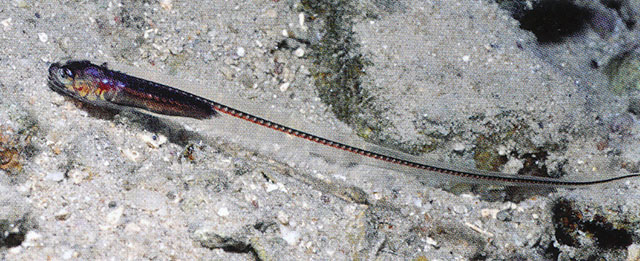| Carapidae (Pearlfishes), subfamily: Carapinae |
| 19 cm TL (male/unsexed) |
|
reef-associated; marine; depth range 0 - 30 m, non-migratory |
| Indo-Pacific: Red Sea and the east coast of Africa (Ref. 583) to the Society Islands (Ref. 9710), as far north as Taiwan, but not Hawaii, and probably south to Tasmania. |
|
Dorsal soft rays (total): 33-38; Anal soft rays: 53-61; Vertebrae: 116-128. Eel-like, moderate to shallow body depth; maxilla free and movable; cardiform teeth present; branchiostegal membranes partly or completely united; swim bladder with thin terminal membrane or bulb; lacking enlarged dentary or premaxillary fangs, dentary diastema, pelvic fins, and swim bladder rocker bone (Ref. 34024).
Description: Characterized by translucent with silvery cheek and abdomen; length of pectoral fin 1.9-2.6 in head length; head depth greater than body depth, about 15 in TL; head length about 8.0 in TL; two rows of incurved teeth in jaws, largest are the inner row of upper jaw and outer row of lower jaw; vomer with 2-6 enlarged teeth in middle row on protruding vomer; 2-3 rows of teeth in palatines (Ref. 90102). |
| This uncommon (Ref. 34024) pearlfish inhabits the coelom and respiratory trees of some holothurians, especially Stichopus chloronotus and Holothuria argus. It is apparently in competition with Jordanicus gracilis [= Encheliophis gracilis] for its preferred host H. argus. Although most occur singly, there is a tendency towards sexual pairing inside the host. Found to depths over 30 m (Ref. 9710). Stomach contents which include amphipod, shrimp and fish indicate non-parasitic, foraging habits (Ref. 6395). Leaves host at night to prey on small fishes and shrimps (Ref 90102). |
|
Least Concern (LC); Date assessed: 15 August 2019 Ref. (130435)
|
| harmless |
|
Source and more info: www.fishbase.org. For personal, classroom, and other internal use only. Not for publication.

